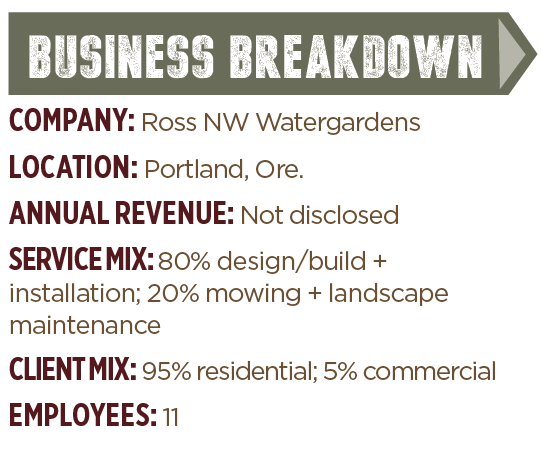As design/build business picked up, one company found a better way to manage and communicate its installation schedule.
 The Problem: As the housing market rebounded and business picked up for Ross NW Watergardens, the Portland-based company found itself scheduling jobs as far as 10 to 14 weeks in advance. Managing this kind of demand was no simple feat. If a project was unexpectedly delayed or expanded, other projects could get help up. By the time a job actually started, it became difficult to remember small details that were discussed during any back-and-forth discussion of the job. Without a system in place, getting a handle on things almost felt unmanageable.
The Problem: As the housing market rebounded and business picked up for Ross NW Watergardens, the Portland-based company found itself scheduling jobs as far as 10 to 14 weeks in advance. Managing this kind of demand was no simple feat. If a project was unexpectedly delayed or expanded, other projects could get help up. By the time a job actually started, it became difficult to remember small details that were discussed during any back-and-forth discussion of the job. Without a system in place, getting a handle on things almost felt unmanageable.
The Team: Managing the schedule mostly falls on the shoulders of Ben Bowen, the company’s head landscape designer and manager. But to devise a solution, Bowen and his father Ross Bowen, the company owner, worked together to put steps in place.
The Solution: As it became difficult to manage a heavily booked schedule, the company opened the lines of communication with clients. Clients had to understand that the start date was only a target, says Bowen, adding that “clarity” and “transparency” are critical to ensure clients understand and don’t feel strung along. In the end, clients typically appreciate the flexibility allows them to make possible changes of their own once it’s their turn.
“Clients know that we allow them to add extra work while we’re on site, and they appreciate that can mean projects run long,” Bowen says. “I assure them that even though the start date might delay, it will not be because we added a project in front of them. Clients appreciate that we have a fair system we stick to.”
The second key piece to the puzzle is a deposit, which locks in the order of projects. Once a client makes a down payment, his place in line is set. Taking a deposit is an important consideration for any company that’s scheduling work more than three to four weeks in advance, Bowen says.
 “This ensures that only serious and committed clients get a slot,” he says. “Our design/build project funnel brings us a lot of projects, but they don’t always go from initial consultation to contract quickly. If someone cancels just before we’re supposed to start, that can also affect the schedule.”
“This ensures that only serious and committed clients get a slot,” he says. “Our design/build project funnel brings us a lot of projects, but they don’t always go from initial consultation to contract quickly. If someone cancels just before we’re supposed to start, that can also affect the schedule.”
Bowen was initially nervous about requiring deposits, but it has helped prevent last-minute back-outs, and clients understand it holds their space in line. A typical deposit is $1,000 for any project over $5,000.
A third part to the solution came in the form of building “flex time” into the schedule. Every four to five weeks Bowen schedules a “catch-up week.”
“That week may be eaten up by extra work at a project,” Bowen says. “Other times a crew will be able to help another crew on their project to help keep things on schedule. Sometimes we can just move people up a week—which always makes the client happy.”
Finally, to help remember those small details that were getting forgotten between booking and execution, Bowen now accounts for review time in his own schedule the week before starting a new project. He will take 15 to 20 minutes of his day to read through all the email correspondence on a particular job—which sometimes has been as many as 100 emails. By doing so, he’s able to recall exactly what the client expects—even if he or she added a detail at the last minute that wasn’t in the contract.
Today, Bowen says the system is working well. The company runs two installation crews and is able to effectively manage the schedule and keep clients happy, even when they’re booked a few months out. Plus, he says the crews appreciate working for a company that remains so busy.
“Crews love it,” Bowen says. “They view it as job security.”
Payton is a freelance writer based in Philadelphia.
Photo: ©istock.com/grublee

